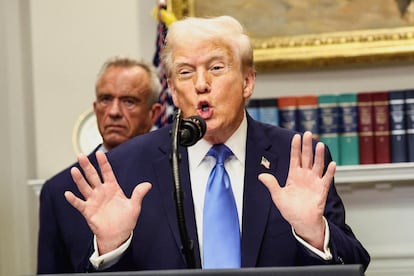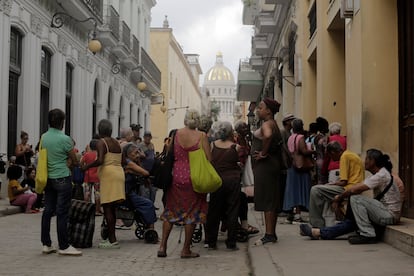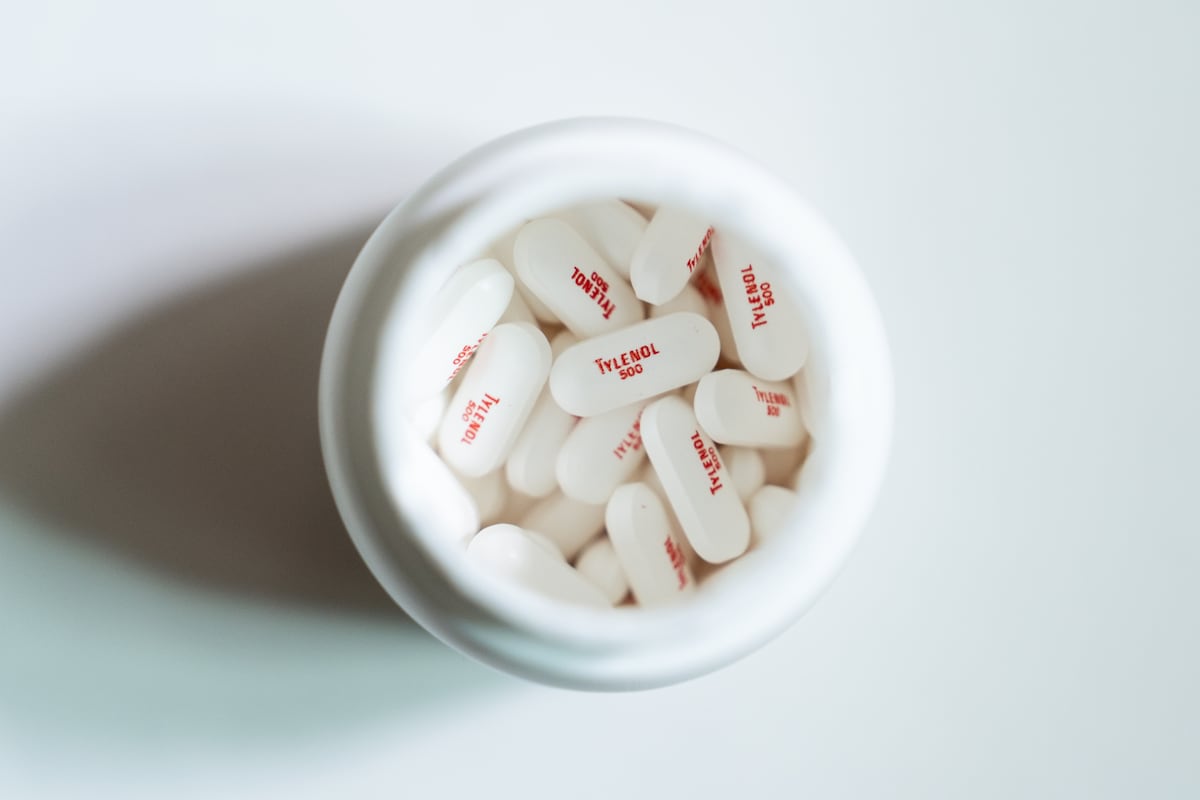Like a prophet of the pharmaceutical industry, Donald Trump took the microphone at the White House this Monday and sent a message to all pregnant women in his country: “Don’t take Tylenol,” he said, referring to the main brand name used in the United States for acetaminophen, better known as paracetamol in some countries and marketed under various brands. He even asked them to “tough it out” and accept the fever and pain. Although this supposed link between acetaminophen and autism is not supported by science and medical organizations immediately came out to deny it, the president dug out evidence perhaps never before amassed by researchers: in countries like Cuba, where “they don’t have money” and therefore consume much less Tylenol, people barely deal with autism, the condition that affects one in every 31 children in the United States.
“I mean, there’s a rumor, and I don’t know if it’s so or not, that Cuba, they don’t have Tylenol because they don’t have the money for Tylenol. And they have virtually no autism, OK. Tell me about that one,” said Trump, flanked by his Secretary of Health and Human Services (HHS), Robert Kennedy Jr., the well-known anti-vaccine activist who had already announced that he would dedicate efforts to researching the condition and that, by September, they would know “what caused” what they considered an “autism epidemic.”
 Donald Trump stands before Robert F. Kennedy Jr. at the White House on September 22.Kevin Lamarque (REUTERS)
Donald Trump stands before Robert F. Kennedy Jr. at the White House on September 22.Kevin Lamarque (REUTERS)
For now, Trump’s claim that Cuba is free of autism is refuted by the numbers. An article published in MEDICC Review in 2017 cites data from the Cuban Ministry of Public Health stated that 1 in every 2,500 Cuban children had been diagnosed with autism at the time. Last April, an official media outlet reported that there were 3,500 registered individuals on the autism spectrum in the country. They also highlighted that the prevalence of autism is 0.4 per 10,000, a lower rate than in other countries. However, some experts suggest that this could be due to underreporting due to the difficulty in establishing the diagnosis.
“Cuba also has autism. A lot. Do we have prevalence rates similar to those of the US or other more affluent countries? Speculation suggests not. But none of that is proven,” said Dr. Yoysy Rondón, national coordinator of Autism and other neurodevelopmental disorders at the Borrás Marfán Hospital in Havana, in statements to the specialized media outlet Autism Spectrum News this year. It is also not true that acetaminophen has not been sold in Cuban pharmacies or that relatives abroad do not provide those on the island with medications, including Tylenol. This has also increased since the General Customs of the Republic authorized the importation of drugs in 2021 without limiting quantities and exempting them from paying tariffs, amid the coronavirus pandemic that exacerbated the health crisis in the country.
Cuban scientist Eduardo López-Collazo, from the Health Research Institute of La Paz University Hospital (IdiPAZ) in Madrid, assured EL PAÍS that although he recognizes that “the lack of medicines on the island is notorious,” it cannot be said “that there is no consumption of paracetamol,” the painkiller that appears in the National Drug Formulary issued by the Cuban Ministry of Public Health.
López-Collazo, on the other hand, would not dare to assert, as Trump did, that there is “a low incidence of autism in Cuba, since both the diagnosis and the monitoring and recording of this and other pathologies are very deficient due to the widespread crisis the island is experiencing.” “Cuba is not a good model to test the hypothesis linking paracetamol during pregnancy with autism,” he maintained. He also insisted that studies suggesting this type of hypothesis “are very weak and merely correlational.” “The scientific consensus is that autism—or, in more technical language, autism spectrum disorders (ASD)—does not have a single cause. For now, we describe it as a set of conditions with multiple roots, in which genetics and environment interact in complex ways.”
Some American institutions have sounded the alarm over the Republican leader’s statements. The American College of Obstetricians and Gynecologists reported that the president’s suggestions “are not only deeply concerning for physicians, but also irresponsible considering the harmful and confusing message they send to pregnant patients.” Kenvue, the company behind the Tylenol brand, insisted that more than a decade of research confirms “that there is no credible evidence linking acetaminophen to autism.”
The crusade to obtain medicines in Cuba
On Monday, when Trump made the controversial statements linking paracetamol and autism, several activists on the island had begun a painkiller collection campaign on social media, with a message highlighting the need to collect paracetamol, a widely used medication for pain relief and fever reduction. This is the way many have found to obtain medication amid a crisis that, according to the government itself, has caused a shortage of 461 of the 651 medications listed in the Basic Medication List—that is, 70% of the drugs needed by the population.
In a WhatsApp group where people ask for and offer what they have, Vero is in charge of managing the distribution of medicines in the municipality of Pinar del Río. “There are almost no medicines in the pharmacies; it’s not like it used to be, when you just had a prescription,” she says. She also notes that the mothers in the group are afraid their children will get sick. “That they’ll end up in a hospital because there are no medicines or supplies. That terrifies us,” she confesses.
 People wait their turn outside a state-run pharmacy in Havana, Cuba, on March 6, 2024.Ariel Ley (AP)
People wait their turn outside a state-run pharmacy in Havana, Cuba, on March 6, 2024.Ariel Ley (AP)
The other option left to Cubans is the almost unobtainable products on the black market. Lists of medications circulating in the country, mostly from abroad, include 500 grams of paracetamol and a host of other drugs impossible to find in state pharmacies.
Dianisleidys López Zayas, from Pinar del Río, mother of a six-year-old autistic child who never took paracetamol during her pregnancy “because it wasn’t necessary,” is “disappointed” with the care provided to children with autism in Cuba. Today, she has to buy the valproate or clonazepam her son needs from retail outlets and at prices she can’t afford. The same is happening to Ania Argudin Páez, whose 13-year-old son suffers from Lennox syndrome and is decompensated because he doesn’t have Clobazam. His mother, who earns a monthly salary of 2,800 Cuban pesos (just over $6 on the informal market), has to buy blister packs of pills for 500 and 600 pesos (between $1 and $1.50). Sometimes, she buys paracetamol to relieve his fever. “I feel very overwhelmed by this situation,” she says. “My son depends on these medications to avoid seizures, and we have no support from the government or any institution.”
The latest study by the Cuban Observatory of Human Rights (OCDH) shows that only 3% of Cubans currently obtain medicines at pharmacies. The reason, according to authorities, is the lack of imported components used in the manufacture of medications. But the lack of medicines adds to the general shortages Cubans face, leaving them for hours without electricity, drinking water, food, and, consequently, without a system that guarantees their health services.
Sign up forour weekly newsletterto get more English-language news coverage from EL PAÍS USA Edition
